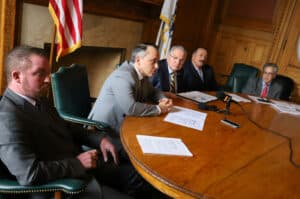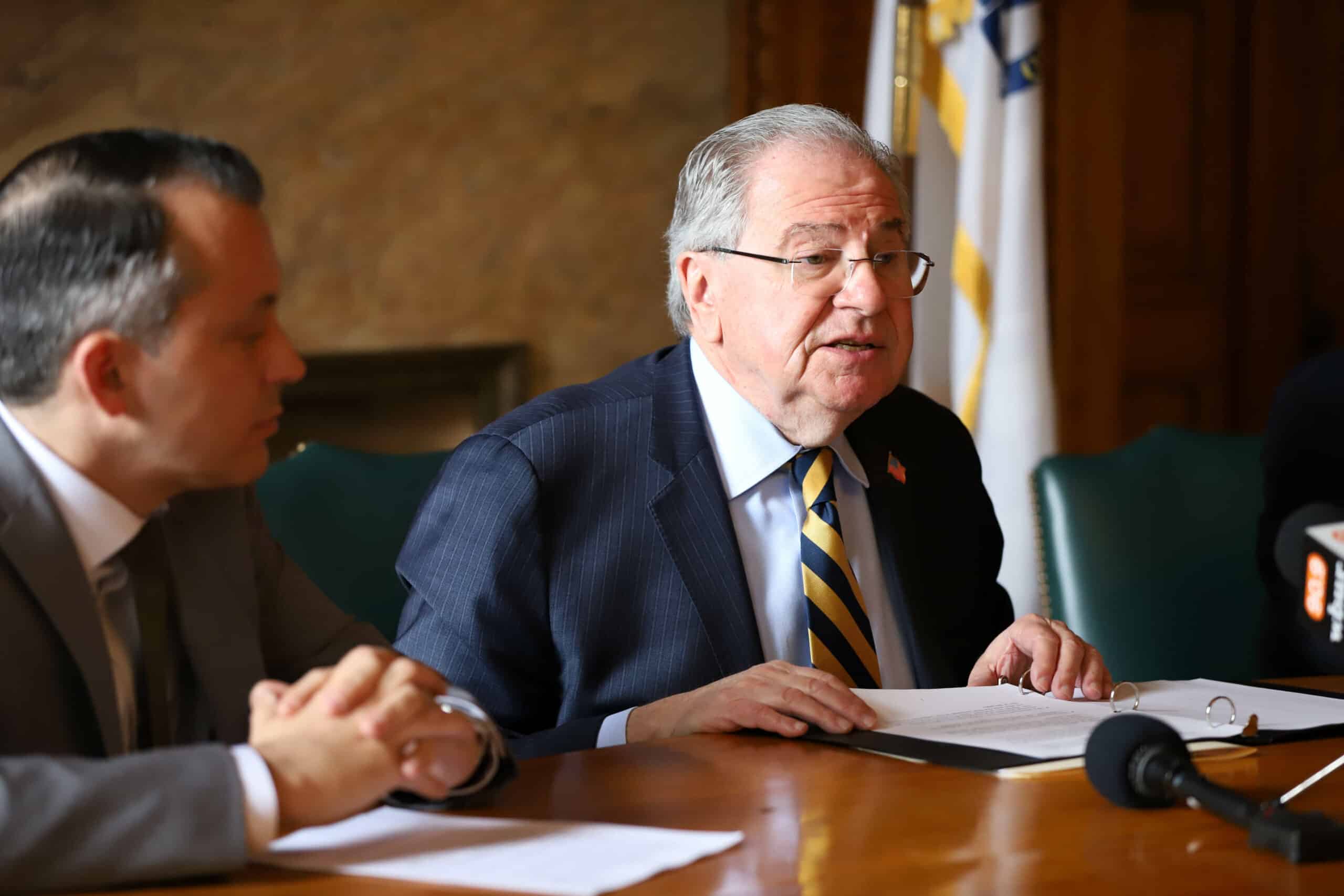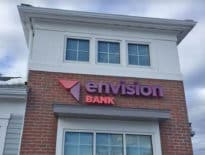
Revenue Chairman Mark Cusack, Ways and Means Chairman Aaron Michlewitz, Speaker Robert DeLeo, Majority Leader Ron Mariano and Transportation Chairman William Straus briefed reporters Wednesday morning on their transportation funding bill, which they planned to roll out to colleagues later Wednesday in a private caucus. Photo by Sam Doran | State House News Service
A 5-cent increase in the gas tax and higher corporate taxes will be the centerpiece of a major revenue bill that House Democratic leaders will ask legislators to vote on next week as part of a package that could raise over $600 million in new funding for transportation.
The long-awaited revenue proposal would also hike fees on ride-hailing trips taken through services like Uber and Lyft and eliminate what Majority Leader Ron Mariano called a “kiss” to the rental car industry by getting rid of their exemption – worth $110 million – from sales taxes on the purchase of new vehicles.
House Speaker Robert DeLeo laid out the proposal – which does not spell out as much new spending as it seeks in revenue – Wednesday morning as he prepared to present it to House Democrats in a private caucus later in the day.
The package, which is projected to generate between $522 million and $612 million in new annual revenue, will be used, leaders said, to shore up existing operating budgets for the MBTA and regional transit authorities, and backstop a multi-billion-dollar capital borrowing plan.
DeLeo called it a “bridge” to the proposed 2022 ballot question to add a surtax on household income over $1 million, which has been projected to be worth another $2 billion for transportation and education.
“When it comes to transportation, revenue can’t wait,” DeLeo said.
Jim Aloisi, who served as transportation secretary under Gov. Deval Patrick and remains a vocal transportation advocate, called the House plan “underwhelming.”
The Greater Boston Chamber of Commerce, which helped lead the drive for a massive increase in transportation funding, applauded the overall package as a something that “starts us on the path” of improvement but criticized it for seeming to ignore many key infrastructure and service improvement needs.
The revenue bill and a $14.5 billion transportation bond bill both will be taken up next week, the speaker said. Transportation Committee Chairman William Straus said that Gov. Charlie Baker’s borrowing bill had been trimmed by House leaders by roughly $3.5 billion because they do not believe that the state can afford the $18 billion proposed by Baker without additional revenue coming into state coffers.
Straus said Baker planned to rely only on “two dangerous revenue sources” – the still-in-development Transportation and Climate Initiative (TCI) and expansion of grant anticipation notes – to secure bonds for billions of dollars in proposed capital spending.
Gas, Corporate Taxes Raised
The bill proposes to raise the state’s 24-cent gas tax to 29 cents per gallon, generating an estimated $150 million to $175 million in new revenue. The tax on diesel fuel, which is currently the same as regular gasoline, would climb 9 cents to 33 cents. The bill directs the administration to find a way to offset some of the proposed increase if TCI does lead to higher gas prices for consumers.
Straus said that even with the per-gallon taxes Massachusetts would have a lower gas tax than all bordering states, with the exception of New Hampshire. Baker opposes raising the gas tax.
Revenue Committee Chairman Mark Cusack said that for the first time since 1989, House leaders will propose increasing the $456 minimum tax paid by corporations. Cusack said that between 60 percent and 70 percent of all corporations in Massachusetts pay the minimum, and that 403 companies in 2016 with over $1 billion in sales paid just $456 in corporate taxes.
The House plans to create a corporate minimum tax structure with nine tiers. On the low end, companies with less than $1 million in sales would see no increase, but at the top tier companies with over $1 billion would pay a minimum of $150,000.
The increased corporate minimum tax would generate $100 million to $150 million in new revenue.
The Greater Boston Chamber of Commerce called the corporate minimum tax hike “problematic,” and urged the legislature to reconsider that provision.
Uber, Lyft Fees Hiked
The final piece of the revenue package would be an increase in the 20-cent fee on all rides taken with transportation network companies like Uber and Lyft. The fees on shared rides would stay the same, but single-person rides would be taxed at $1.20 and luxury and livery vehicles would pay $2.20 per ride.
The House also wants to charge out-of-state TNC drivers a new 50-cent fee for pickups in Massachusetts. The new TNC fees, which go beyond the $1 fee Gov. Baker proposed in his budget, would net the state an additional $130 million to $145 million.
“This plan, I believe, represents an infusion of critical funds to address the crisis at the T and regional equity issues compounded by congestion,” DeLeo said.
How Money Would Be Spent
However, House Democratic leaders do not intend to spend the new revenue dollar-for-dollar immediately to address aging public transit, crumbling roads and bridges and widespread traffic that prompted crafting of the package.
Instead, they want to use most of the new money – estimated between $522 million and $612 million per year – to fill the state’s accounts more robustly, allowing for larger annual budgetary injections into public transit and road maintenance assistance each year and helping to pay for capital projects the Baker administration suggested funding through borrowing.
The MBTA would see $27 million in dedicated new revenue each year, and House leaders hope that the state will finally be able to commit to fully implementing a $160 million annual transfer to the T – a payment that is already required by law, but for years has gone underfunded.
In each of the past three budgets, the state approved transfers of $127 million to the MBTA, while it transferred $187 million in fiscal year 2017. Baker proposed a $200 million transfer to the MBTA, in addition to its dedicated sales tax funding, in his fiscal 2021 budget filed in January.
The state’s 15 regional transit authorities would also gain a new dedicated revenue stream, mirroring the T’s $27 million per year coming from new transportation network company fees. Also like the MBTA, the House plan would commit to fully funding the $15 million annual transfer to RTAs without guaranteeing spending above it.
The revenue bill also creates a new $10 million annual fund – also stemming from the higher ride-hailing fees – for rural transit assistance. Lawmakers said they wanted to ensure the changes stretch across the state, not just in densely populated areas or the greater Boston region.
“These folks may not have RTAs, may not have T access or bus service, yet still have infrastructure needs that are ignored,” Mariano said.
In the separate transportation bond bill, House leaders are recommending that the state finally increase the annual appropriation for local road and bridge maintenance under the Chapter 90 to $300 million.
The revenue bill also calls for further study of a high-speed rail connection from Boston to Springfield or Pittsfield, a new commission of “outside experts” to study congestion pricing and tolling systems that could be used to change commuting behaviors.




 |
| 

